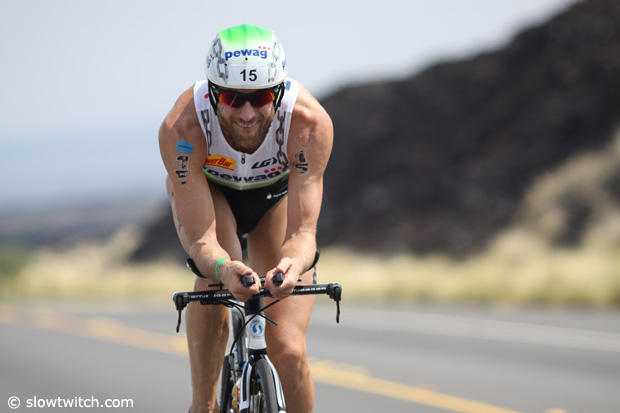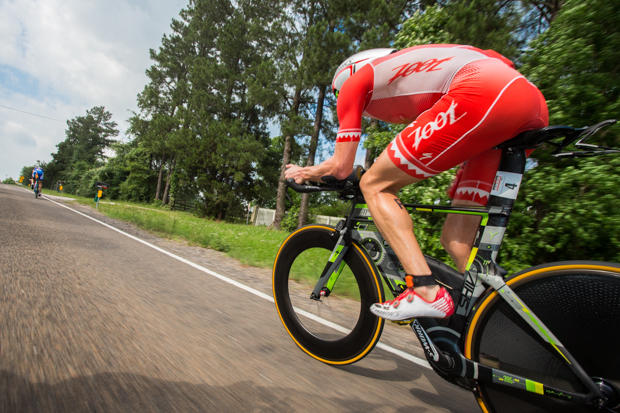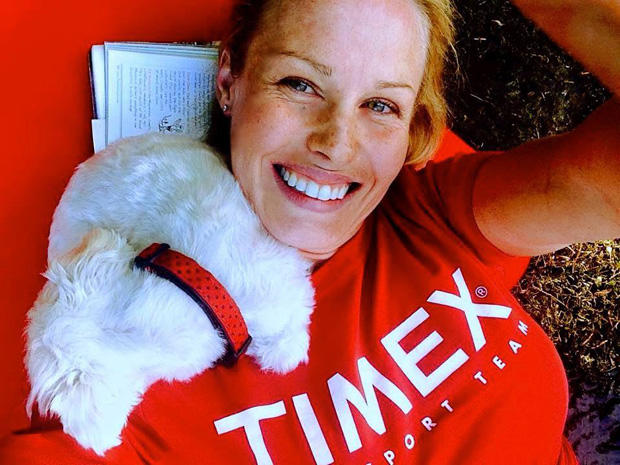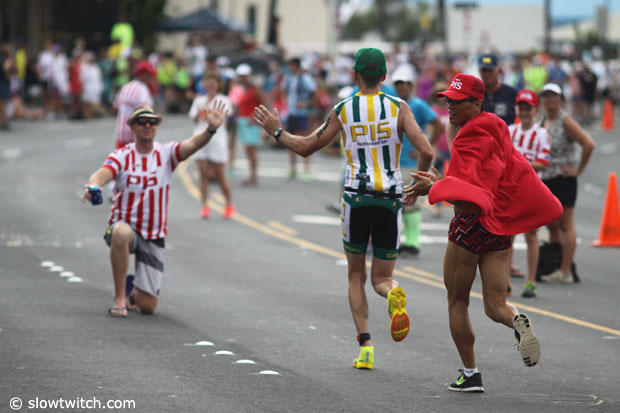Soaring high with a broken wing
Brian August of Team Every Man Jack crashed hard during Ironman Texas and broke his elbow in the fall half way through the bike segment. The Portland, Oregon resident got back up, finished the bike ride and ran the marathon. He placed in the M45-49 age group and will now go to Kona.
Slowtwitch: It is good to chat with you Brian.
Brian August: Thank you Herbert. How are you?
ST: Well I did not fall off my bike, so all is well.
Brian: You should try it some time. It is not as bad as you think.
ST: I surely have fallen off my bike a few times before but never liked it.
Brian: I have a friend named Erik Svans who raced this race in 2012 and was doing very well. He hit the first aid station at mile 10 and wrecked hard. He finished but he walked the whole marathon and was in really bad shape. So I was thinking to myself [before the race] – whatever you do, just don’t crash at the aid stations. And I was actually extra careful, but then well, you know.
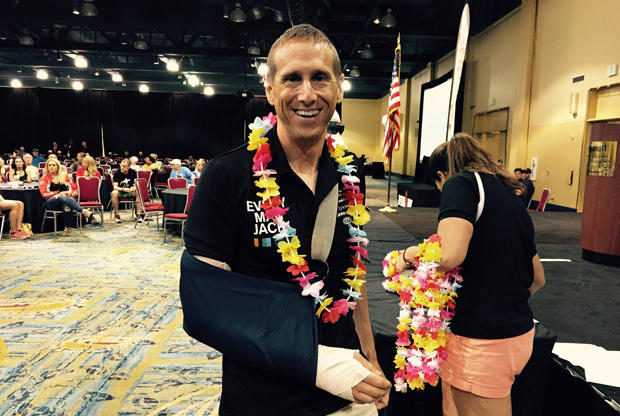
ST: Did the crash happen at an aid station?
Brian: No, It was Special Needs.
ST: I assume this was your big A race at least of this first half of the year.
Brian: Absolutely. The goal was actually to get on the podium and being able to race the top of the age group and yeah, I was able to accomplish that – which was fantastic. It was definitely my A race.
ST: I think you are a fairly good swimmer. Is that correct?
Brian: Yeah, I am usually out in the top 2 or 3 in the swim for Ironman or Half Ironman events, and that is typically where my strength is. Normally for me the way these races go, I start with a good swim and am one of the first people on the bike and then it is basically a 5 ½-hour parade of people coming by, and I rarely pass people on the bike. But this was the first race where only 2 or 3 people came by my during first couple of hours and that was an entirely different race experience for me. Basically being near the front and holding people off. It is due to the work I have been doing with my coach Craig Upton out of Mill Valley and just being able to hold better power on the bike, and have better aerodynamics. I also upgraded my bike to a new Felt IA4 and that made all the difference.
ST: Going back to that swim, does that mean you were first out of the water?
Brian: I was the first amateur out of the water, but I wasn’t the fastest amateur. Someone else beat me by about 12 seconds. It was a rolling start just like in a marathon, and I was out in front, but clearly someone behind me was faster.
ST: Do you think these rolling starts make it a fairer race?
Brian: I don’t know if it is fairer. I think for people who don’t like the mass swim starts it is a better race because it is less crowded and less elbow action, but for me, I am always out in the front so I don’t really experience that. It makes it easier for people as they can focus on the whole race and not just the swim. The downside is that you don’t really know where you are in the field. You might be ahead of someone on the course, but they are actually ahead of you in time. So you can’t really feel safe where you are.
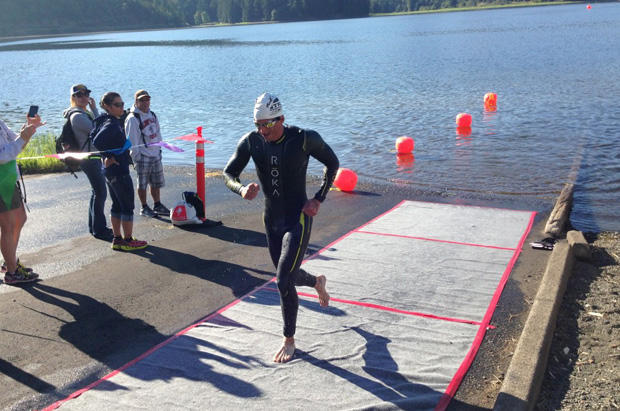
ST: Let us go back to that crash. When it happened, what was the first thing that went through your mind?
Brian: That hurt. [laughs] It was in Special Needs and the volunteer was handing me my Special Needs bag, which had some bottles of liquid in it. I don’t know exactly what happened, but you know those cases when your bike turns sharply and just throws you down? It was one of those versus those where you go down in slow motion. So I am on the ground kind of not feeling great, but the first thought was to work out the problem. So I tested the legs and while they were scraped up, they seemed ok. Then I looked at the bike and it was all in one piece, and I looked to be in one piece. I could feel that my arm was pretty painful at that moment, but it was not excruciating. So I started to move around and looked to get back on my bike. My thought was go on the bike until you can’t go anymore. So I changed my bottles out, got back on the bike and started pedaling. I then quickly realized that I could not shift with my right arm. It was ok in the aero position but I just could not shift, and I could not sit up on the bars, as I could not put any weight on it. So I just shifted with my left arm most of the time and shifted a lot less during the second half of the bike.
ST: Do you have mechanical or electronic shifting?
Brian: It is mechanical shifting.
ST: You said you refilled you bottles, and I guess that means they did not spill in the crash.
Brian: No, they were just simple plastic bike bottles and they survived.
ST: Were you at all worried about being able to run?
Brian: I wasn’t sure what was going to happen, but I was just taking it a couple miles at a time. On the bike I was just hoping the situation with the shifting wasn’t getting worse, and I told myself get to the end of the bike and then see what it feels like to run. I suspected I would be able to run. I figured if I could ride a bike I likely should be able to run. My legs were not in trouble, other than the normal tired racing cramping, and I decided go and see. I definitely did not want the arm to be looked at, because I was worried that it was either broken or sprained or something. I did not want to go to the medical tent and have them stop my race. If the race was going to end it was going to be on my terms.
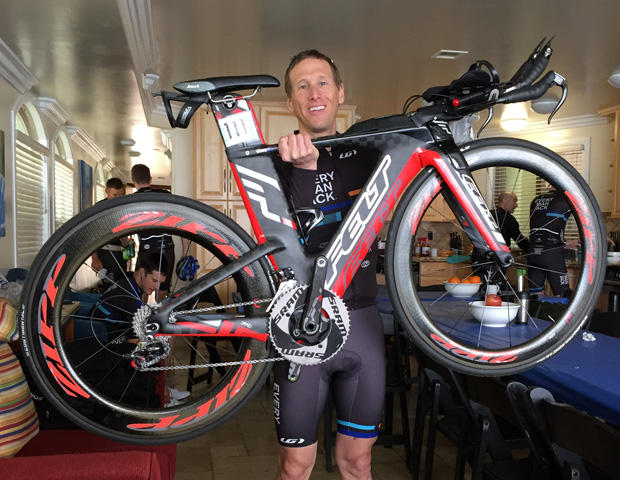
ST: As you pushed along, were you inspired by the thought that not many people were passing you?
Brian: That definitely helped because it was a new experience for me. And it did not hurt my arm more when I was going harder versus going easier, and I took some comfort in that. And I am not sure if you are aware of this, but a guy [Alistair Corkett] in the Portland area was recently in a very bad bike accident and one of his legs severed, and so I was thinking [my situation] is really not such a big deal.
ST: Were you still thinking about the podium or just about to keep going?
Brian: It crossed my mind, but I was prepared to stay in the moment and that really helped me. I did not really think about the marathon or the podium, but did think the podium might be a long shot. But you just control what you can and those things are kind of out of my control.
ST: How did the arm feel during the run?
Brian: It was sore and it hurt, but I was able to carry a water bottle in it. I could not raise the arm to drink from it, or to refill it. I had to stick it in my underarm and then use my left arm to unscrew it. It was bothering me, but it wasn’t jarring, uncomfortable is likely the best way to describe it. But I literally ran mile by mile from aid station to aid station and took in drinks and nutrition. At the first aid station my quads were cramping so bad that I had to stop and the volunteers were great and gave me four cups of Gatorade that I drank down, and then just ran to the next aid station. Also seeing my teammates from Team Every Man Jack on the course was very inspirational. That really helped a lot.
ST: So how many of you Every Man Jack guys were there?
Brian: I believe there were eight of us spread out over various age groups, and a lot of us were actually running fairly close together.
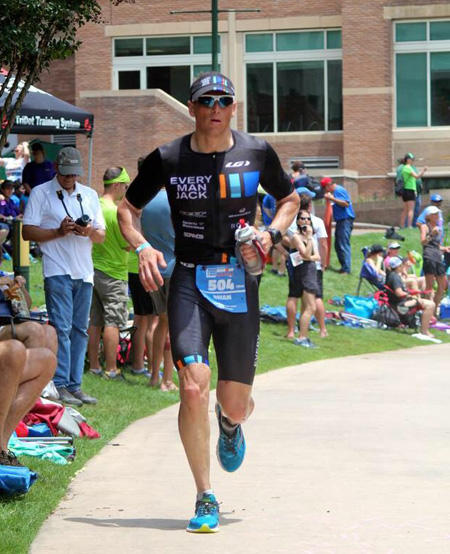
ST: Did any of them wonder why you held your arm funny?
Brian: Not during the race, and at least no one mentioned it. After the race it was pretty clear that something had gone on. But late during the run mot everyone looks hurt, so I am not sure what qualifies as running funny.
ST: Did you have to warn them to not bear hug you?
Brian: We did a lot of left-handed high fives. After the finish my arm was in a sling to support it, but that also warned folks from bumping into me.
ST: How long did it then take to figure out that you had done well?
Brian: Probably 15 minutes after the finish. Tom Trauger who is also on Team Every Man Jack won the 50-54 age group, actually I think he was second, and we finished within 20 seconds of each other, so we figured I might be in the top three. Because of the rolling start it was a bit unclear where, but we both had a sense. With age group numbers on the calves you kind of know who came by you.
ST: How long have you been on Team Every Man Jack?
Brian: It is my second year. Ritch (Viola) and I swam Masters together in San Francisco and we both joined a local triathlon team, before he started with Team Every Man Jack. I then moved away from the Bay area to Portland, Oregon but Ritch and I stayed in touch. He then offered the opportunity to be on the team and I jumped at it. The camaraderie and the types of athletes they have on the team is simply amazing. There is guy on the team named Jackson Dovey who led his race in Texas at mile 30 on the bike and then absolutely shredded his tire and could not finish the race. But as soon as I started the run he was out there, cheering, screaming and yelling for all of us. And that is the type of person Ritch attracts – humble and supportive of each other.
ST: What do you do in Portland?
Brian: I am a business consult for a company called Slalom Consulting and we are doing management consulting for business and technology.
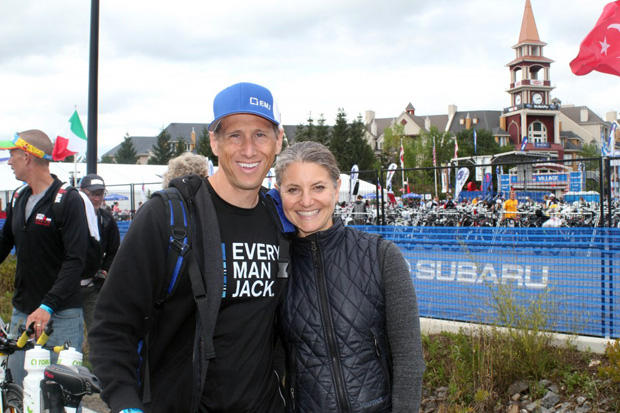
ST: Anything else we should know?
Brian: I just think it was a really lucky day for me. It turns out I fractured my radial head and if you need to break something in your elbow, that is the thing to break. So I was fortunate to able to continue on and have a good result. I can’t say enough about the race, the volunteers, the whole Team Every Man Jack, our sponsors like Felt Bicycles. Everything came together and I especially have to thank my partner Dana Katz who has been with me at every Ironman I have done. She is an ultra runner and running coach. Everything came together and it is an amazing experience when it works.
ST: Well I look forward to see you this October in Kona.
Brian: Absolutely. I look forward to it and hopefully keep the rubber side down this time.
Images 1 and 3 are from Ironman Texas, images 2, 4 and 5 were taken at other events and are all courtesy of Brian August.
The Twitter handle of Brian August is @bkaugust and he puts his race reports up on ultrafitness.com


